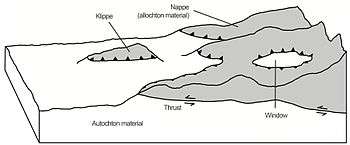Klippe
- For the style of coin, see Klippe (coin).

Schematic overview of a thrust system. The shaded material is called a nappe. The erosional hole is called a window or fenster. The klippe is the isolated block of the nappe overlying autochthonous material.
A klippe (German for cliff or crag) is a geological feature of thrust fault terrains. The klippe is the remnant portion of a nappe after erosion has removed connecting portions of the nappe. This process results in an outlier of exotic, often nearly horizontally translated strata overlying autochthonous strata.[1] Examples of klippes include:
- Chief Mountain, Montana
- Mount Yamnuska, Alberta
- The Rock of Gibraltar
Klippes may also be found in the Pre-Alps of Switzerland and some of the isolated mountains in Assynt, Sutherland, in NW Scotland.[2]
References
- ↑ DiPietro, Joseph A. (December 21, 2012). Landscape Evolution in the United States: An Introduction to the Geography, Geology, and Natural History. Newnes. p. 343. ISBN 9780123978066. Retrieved 10 February 2016.
- ↑ Whittow, John (1984). Dictionary of Physical Geography. London: Penguin, 1984, p. 294. ISBN 0-14-051094-X.
This article is issued from Wikipedia - version of the 2/10/2016. The text is available under the Creative Commons Attribution/Share Alike but additional terms may apply for the media files.